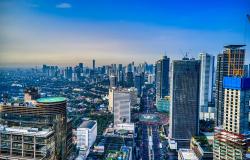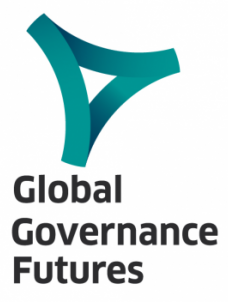Dual Pandemics: COVID-19 and Disinformation in Indonesia - A Conversation with GGF 2035 Fellow Nurma Fitrianingrum

This interview was conducted by the Global Governance Futures – Robert Bosch Foundation Multilateral Dialogues, which brings together young professionals to look ahead 10 years and recommend ways to address global challenges.
- How has social media transformed journalism and the exchange of information in Indonesia?
With social media’s rising popularity in Indonesia since the late 2000s, online social platforms have changed how Indonesians consume news and information. Increasingly, more people consume their daily news on social media, whether it comes directly from news companies, is shared by friends or promoted by algorithms. In Indonesia, people also receive and exchange updates and news stories through private messaging apps like WhatsApp – a platform which is used in the country as both a personal and professional means of communication. This creates a larger problem: article links or fragmented pieces of information shared in closed environments like WhatsApp groups often include fake news and misinformation. In the case of Indonesia, where critical reading skills are low and the urge to share information is high, misinformation spreads like wildfire. However, due to the end-to-end encryption and other privacy protections contained within messaging applications, the scope of misinformation and the damage of its spread in places like WhatsApp is understudied.
- Indonesia is no stranger to the proliferation of fake news. What do you see as the causes behind the increasing spread of misinformation and disinformation in Indonesia?
 The number of internet users in Indonesia has grown in recent years, and the COVID-19 pandemic has only increased that growth as many employees and students are required to work or study from home. It is estimated that around 196.7 million Indonesians – roughly 73.7 percent of the country’s population – frequently use the internet. However, despite Indonesia’s high number of internet users, digital literacy remains very low. Based on the Institute for Management Development’s World Digital Competitiveness Ranking for 2020, Indonesia ranks 44 out of 63 on digital/technological skills. Indonesia’s overall literacy rate is no better: a report by Miller and KcKenna in 2016 ranked Indonesia as the second least literate of the 61 countries included. The low literacy rate, in addition to poor digital literacy, is believed to be one of the main factors contributing to the massive proliferation of fake news within the country.
The number of internet users in Indonesia has grown in recent years, and the COVID-19 pandemic has only increased that growth as many employees and students are required to work or study from home. It is estimated that around 196.7 million Indonesians – roughly 73.7 percent of the country’s population – frequently use the internet. However, despite Indonesia’s high number of internet users, digital literacy remains very low. Based on the Institute for Management Development’s World Digital Competitiveness Ranking for 2020, Indonesia ranks 44 out of 63 on digital/technological skills. Indonesia’s overall literacy rate is no better: a report by Miller and KcKenna in 2016 ranked Indonesia as the second least literate of the 61 countries included. The low literacy rate, in addition to poor digital literacy, is believed to be one of the main factors contributing to the massive proliferation of fake news within the country.
In my opinion, another major determinant for the spread of misinformation is growing polarization in Indonesia. While Indonesia was once considered one of the least polarized democratic nations in Asia, the situation drastically changed during the 2014 presidential election. The competition between Indonesian presidential candidates Joko Widodo and Prabowo Subianto – particularly their smear campaign strategies – ignited latent political tensions between fundamentalists and pluralists in the country. The polarization then escalated again during the 2017 Jakarta gubernatorial election and even further during the 2019 presidential election. The political mudslinging during and after the 2019 election went on to spread and intensify online. In Indonesia, supporters of individual candidates often employ fake news on social media platforms such as Facebook and Twitter as a strategy to attack and smear political opponents or government’s policy. Politicians even hire political influencers, who are known locally as buzzers, to influence public opinion. Some of these influencers intentionally use disinformation in an attempt to sway public opinion. Supporters of these Indonesian parties or politicians often fall for this fake news, and further spread misinformation through social media and other messaging apps. This false information is also used to attack those with different points of view.
- How did the spread of fake news affect the Indonesian government’s response to the pandemic?
The COVID-19 pandemic has brought with it a new wave of fake news and disinformation in Indonesia, especially in the early months of the coronavirus’ outbreak. As the COVID-19 cases began to rise, people spread misinformation about the virus on social media, including conspiracy theories that coronavirus was created by Bill Gates. Other fake news claimed that the World Health Organization lied about the virus, and asserted that COVID-19 was no more dangerous than a regular flu, meaning that people did not need to wear masks or keep physical distance. The spread of misinformation has also hampered the implementation of the Indonesian government’s emergency measures to contain the outbreak. For example, some people ignored the public mask mandate and / or protested the large-scale social restrictions and semi-lockdown policies imposed by some local governments. Largely, these protests came about because citizens believed the propaganda spread by social media influencers. Furthermore, when the Indonesian government started the vaccination program in January 2021, even more fake news and disinformation surrounding the COVID-19 vaccine began to circulate. However, it is important to note that, even prior to the outbreak of the coronavirus, anti-vaccine communities and campaigns have flourished in Indonesia. The spread of misinformation created by conspiracy theorists has caused chaos and distress among the public, especially from frontline workers who carry the heavy burden of caring for the influx of COVID-19 patients. As a result, the government has had to allocate its already limited resources to fight COVID-19 fake news.
- The Indonesian government has introduced regulations that moderate internet content considered "negative", which arguably limits the freedom of social media and internet providers. How do these regulations challenge or contribute to fight against misinformation?
The Indonesian government first introduced the content moderation regulations in 2014 through the Minister of Communication and Informatics (MOCI) Regulation No.19. This provided the government, and also individuals, with the right to ask social platforms to block or take down content deemed ‘negative’, which the regulation and other laws have defined as: 1) porn, child violence and violations of internet security; 2) terrorism propaganda, banned topics such as ethnic, religion, race, and other group-based interests, and hate speech; 3) illegal investment, fraud, gambling, illegal food, and drugs; 4) intellectual property and copyright (infringement); and last but not least, 5) content that agitates Indonesian society and disturbs public order. The Indonesian government can directly block sites that host the aforementioned content. However, last year, the ministry revoked the regulation to make social platforms responsible for active content moderation through regulation No. 5/2020. The term ‘negative content’ is no longer used in the regulation – however, the types of content that are deemed as prohibited remain relatively the same. Online platforms are now obligated to remove and block any prohibited content based on the categories prescribed by the Indonesian government. The government has actively used this regulation to ‘sterilize’ the internet in Indonesia from all negative content. However, since the regulation itself does not directly address the issue of misinformation, fake news persists. In fact, the only category within this regulation that could be used to fight misinformation is in the ‘problematic’ clause on content that creates disturbance in public order, in which case the public or a government institution can file a report to Indonesia’s Ministry of Communication and Informatics about the problematic content. Following the report, the ministry can ask the platform to remove the fake news.
While the power over content moderation rests with social platforms, the Indonesian government also has a part to play in the fight against fake news. Indonesia’s Ministry of Communication and Informatics launched the website Aduan Konten (Content Reporting) for reporting fake news and negative contents. The ministry also created a website exclusively for debunking misinformation circulated online. However, in my opinion, this debunking approach is a Band-Aid solution for a gaping wound. With the large-scale production and fast circulation of misinformation on the internet – including those on private messaging apps – debunking fake news on a few websites does not solve the larger issue. The number of people creating and spreading misinformation far exceeds the number of those doing the fact checking.
In 2017, in a bid to solve the root cause behind the proliferation of misinformation, the government established a digital literacy movement with various programs, such as: publishing material for digital literacy, teaching critical thinking skills for the internet, incorporating digital literacy into arts activities, promoting a more positive content creation through the School of Influencer program, and informative sessions organized by content creators to boost awareness about misinformation. These efforts are ongoing each year and include collaboration with communities and partnerships with Indonesian tech companies.
- How do Indonesians perceive the government’s interference with online content moderation?
The Indonesian government has tried to combat the spread of disinformation with several approaches, such as partnering with social media companies to take down content containing false information on COVID-19. The Ministry of Communication and Informatics (MOCI) claimed to have removed 111 instances of misinformation related to the coronavirus vaccine on various platforms. In this way, the government has mostly implemented ordinary measures to solve an extraordinary problem. Even so, any effort to curb misinformation is progress, especially during a pandemic in which the spread of fake news can be so damaging and create a vast amount of confusion and anxiety for the public. On the other hand, civil society groups have done a better job than the government at educating the public about COVID-19 and combating disinformation – at least in virtual spaces. For example, the Instagram account @pandemictalks, which is managed by three individuals, has presented information about COVID-19 better and more concisely than the Indonesian government’s account.
However, the big picture implications of the government’s moderation policy is even more problematic. With only vague definitions of prohibited content, the Indonesian government has left room for multiple interpretations and possible misuse – including from the government itself. The regulation also grants the MOCI the right to decide which a content fall into the prohibited category. The MOCI’s new regulation No.5/2020 – which uses the open and unclear term ‘created disturbance in public order’ as its definition of prohibited content – grants too much decision-making power to MOCI. In doing so, it is prone to further misuse and could potentially harm individual’s freedom of speech and expression. In some cases, the government singlehandedly defined a site’s content as ‘prohibited’, and thus blocked the entire site. For example, at one point, the Indonesian government blocked Vimeo because the platform hosted pornographic content that was uploaded by its global users. This caused a wave of protest from the Indonesian users who use the site to upload and promote their creative work. Civil society organizations and activists have also criticized the government’s approach of taking down content or sites without any court process, transparency or accountability, which has contradicted the freedom of expression protected under the Indonesian constitution. In the end, the only way to improve the situation is to educate citizens about digital literacy, and most importantly, fix the education system that poses an obstacle for any sustainable approach to fighting misinformation in Indonesia.
Nurma Fitrianingrum is junior project officer at Tifa Foundation in Indonesia. She is a fellow of the Global Governance Futures – Robert Bosch Foundation Multilateral Dialogues program. These views expressed in this interview are her own and do not represent her official position.


